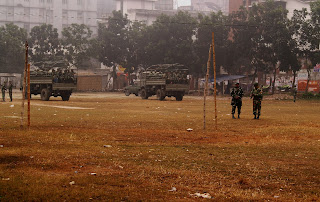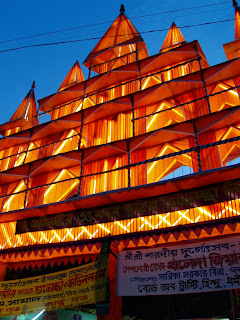The last couple of weeks have offered some new insights into the strange social worlds of Bangladesh. I’ve been to a Hindu wedding, I’ve had dinner with Professor Yunus’s brother and seen a wet spring festival. On top of all that, I had to chase a stalker away from VSO.
To start with Yunus: last Thursday I went to dinner at the penthouse, very gay pad of Hero, another volunteer’s NGO’s chairman. This was the same guy that tried to recruit me for the Banglalink mobile phone company TV advert (I was too young for the role). He lives in an incredibly smart apartment, with cushions all over the floor, and flowers and art and uplighters, right in the middle of wealthy central Dhaka. His mother and sisters crowd into the rest of the flat that is not his ‘pad’. A few famous Bangladeshi singers, actors and dancers were there, as well as some people from Britain over to visit. We were all chatting, or looking stunned at a room I had only seen in a Dulux paint catalogue before now, when the next guest arrived.
Bangladesh is a thankfully a place where two types of people get idolised and admired. The first are cricket players, Brazilian footballers and Beckham, and the second are intellectuals. Hence Professor Md. Yunus – 2006 Nobel Peace Prize Winner – has been consistently lauded in Bangladesh since October, when he received this award. He has his own trademarks: slightly long grey hair, a wide, toothy grin and long colourful; waistcoats worn over white Punjabis. Having met the collection of people at this party, this final guest arrived, decked out in the same garb and wearing the same ridiculous smile. Though I would not normally be particularly impressed by ‘celebrity’, it was a little bit a of shock, and it took a moment before someone pointed out this was Yunus’ brother. This was after someone had whispered ‘bugger me, its Yunus’, a little loudly.
The brother is clearly not Nobel potential, spending a long part of the evening watching television. It was like one of those people hired to be at a party as a look-a-like, and a disappointing one at that.
The wedding took place a couple of days earlier, being that of Pullak’s sister. Pullak was one of our language teachers, and also one Bangladesh’s most depressed men. He often would moan about his low wage and how little money he had, which made the lavish 3 lakhs (300,000 Taka or 2,500 pounds) spent on this event seem very out of character. The wedding was a Hindu one, held in a community centre in some subcentre of Dhaka. Only myself and Mikey (a Canadian volunteer) went along, though all VSO people had been invited. This also proved to be a bizarre experience.
Firstly, the hall was sparsely decorated, with lots of tables set out for dinner and two pagoda style seats as the only ornaments besides intrusive fluorescent lighting. Before eating, the groom arrived, looking about as miserable as you possible could on your wedding day. It is custom for Hindus to be solemn on the day, but this was taking it to Shakespearean levels of misery: he scowled his way into the hall and slumped onto the pagoda before sitting there like some sulking teenager as people took pictures and videos. Nothing, however, gets between a Bengali and his/her stomach, and with the appearance of the first plate of food the groom was abandoned to his solemnity as people dashed to spaces on the tables.
Over three sittings, people stuffed as much fried hilsha fish, chicken tandori, goat curry and pilau rice down their throats as possible, before moving on to the sweet orange rice and sweetmeat. And then they left: within ten minutes of each sitting finishing, most had left. For some, the bride had not even arrived! Even when it is a wedding, they come, eat, and go.
The bride did eventually arrive and went upstairs to the mezzanine floor where the second pagoda was sitting, and sat down, at which point some older women began a sort of wailing that sounded similar to a Sioux Indian war cry, but here was to help prepare the bride for the marriage. She also looked pretty miserable, but we were told that they had not met before and so I could sympathise a little. The dowry gifts offered were mainly toiletries and tissue, so if she was hoping for an Ipod she would have been disappointed.
Anyway, it now being 11.15 and the ceremony still not materialising, we excused ourselves from the remaining 40 or so guests (of about 250 who originally arrived). The ceremony apparently took place at about 12.30: with probably three guests left.
Finally, last Tuesday was the first day of spring, at which normally conservative Muslims throw their reservations out the window and done bright orange or yellow saris, marigold flowers and Punjabis and welcome the Hindu god of love and spring. It being spring it also brought the first rains of the year, finally opening up a blue sky other months of dusty, pollution smothered grey. It is a welcome change.
















 Path
Path



